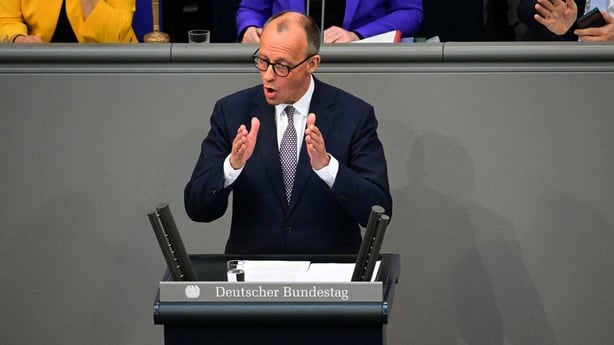Germany's parliament approved plans for a massive spending surge, throwing off decades of fiscal conservatism in hopes of reviving economic growth and scaling up military spending for a new era of European collective defence.
The approval in the Bundestag hands conservative leader Friedrich Merz a huge boost, giving the chancellor-in-waiting a windfall of hundreds of billions of euro to ramp up investment after two years of contraction in Europe's largest economy.
Germany and other European nations have been under pressure to shore up their defences in the face of hostile Russia and shifts in US policy under President Donald Trump, which European leaders fear could leave the continent exposed.
We need your consent to load this rte-player contentWe use rte-player to manage extra content that can set cookies on your device and collect data about your activity. Please review their details and accept them to load the content.Manage PreferencesMr Merz's conservatives and Social Democrats (SPD), who are in talks to form a centrist coalition after last month's election, want to create a €500 billion fund for infrastructure and to ease constitutionally enshrined borrowing rules to allow higher spending on defence.
"We have for at least a decade felt a false sense of security," Mr Merz told politicians ahead of the vote.
"The decision we are taking today on defence readiness ... can be nothing less than the first major step towards a new European defence community," he said.
The legislation still has to go to the Bundesrat upper house, which represents the governments of Germany's 16 federal states.
The main hurdle to passage there appeared to fall yesterday when the Bavarian Free Voters agreed to back the plans.
The conservatives and SPD wanted to pass the legislation through the outgoing parliament for fear it could be blocked by an enlarged contingent of far-right and far-left lawmakers in the next Bundestag starting 25 March.

Mr Merz has justified the tight timetable with the rapidly changing geopolitical situation.
The plans have already lifted euro zone yields, the euro currency and European shares over the past week.
Germany's blue-chip DAX index, which hovered around a record high ahead of the vote, pared some gains, while Germany's ten-year bond yields edged down after the widely anticipated approval of the spending plan.
The euro, which has strengthened in recent weeks as word of the deal emerged, eased slightly.
"This decision has the potential to give our country's history a new direction, a positive beginning for Germany, a positive beginning for Europe," said SPD leader Lars Klingbeil.
"Europe is on the one hand next to an aggressive Russia and, on the other, an unpredictable United States of America."
Easing the debt brake
The reforms mark a major rollback of the so-called debt brake imposed after the 2008 global financial crisis but since criticised by many as outdated and putting Germany into a fiscal straitjacket.
The prospects of a borrowing bonanza lifted German investor morale by more than expected in March, the ZEW economic research institute said.
The construction sector can look forward to a boost from the fund to overhaul Germany's creaking infrastructure while the defence industry also stands to gain.
"The prospect of a fiscal bazooka is causing expectations to skyrocket. Without the tariff drama, expectations might have brightened even more," said Alexander Krueger, chief economist at the private bank, Hauck Aufhäuser Lampe.

But critics, including within his own party, accuse Mr Merz of "voter fraud" for promising spending restraint during the campaign only to announce the shift in fiscal policy just days after winning.
"The politician's greatest asset is credibility," said Tino Chrupalla, co-leader of the far-right Alternative for Germany (AfD) during the debate.
"With these embarrassing actions, Mr Merz, you have already completely squandered yours. The voters feel betrayed by you, and rightly so."
Economists caution further reforms are needed, for example to cut bureaucracy, to ensure sustainable growth.
Fitch Ratings agency also warned Germany's coveted AAA rating could come under pressure in the longer run if its vast spending effort is not offset by consolidation measures or fails to produce a lasting improvement in growth.

